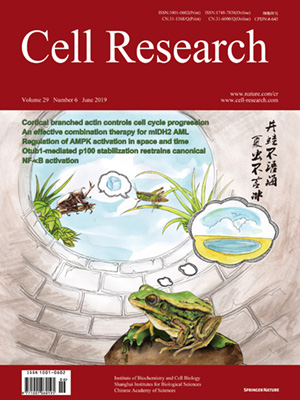
Volume 29, No 6, Jun 2019
ISSN: 1001-0602
EISSN: 1748-7838 2018
impact factor 17.848*
(Clarivate Analytics, 2019)
Volume 29 Issue 6, June 2019: 474-485
ORIGINAL ARTICLES
Preventing abnormal NF-κB activation and autoimmunity by Otub1-mediated p100 stabilization
Yanchuan Li1, Jin-Young Yang1, Xiaoping Xie1, Zuliang Jie1, Lingyun Zhang1,2, Jianhong Shi 1,3, Daniel Lin1, Meidi Gu1, Xiaofei Zhou1, Haiyan S. Li 1, Stephanie S. Watowich 1,4, Antrix Jain 5, Sung Yun Jung 5, Jun Qin5, Xuhong Cheng1 and Shao-Cong Sun 1,4
1Department of Immunology, The University of Texas MD Anderson Cancer Center, 7455 Fannin StreetBox 902, Houston, TX 77030, USA; 2Center for Reproductive Medicine,
Henan Key Laboratory of Reproduction and Genetics, The First Affiliated Hospital of Zhengzhou University, Zhengzhou, Henan 450052, China; 3Central Laboratory, Affiliated
Hospital of Hebei University, Baoding, Hebei 071000, China; 4MD Anderson Cancer Center UTHealth Graduate School of Biomedical Sciences, Houston, TX 77030, USA and 5Verna
and Marrs McLean Department of Biochemistry and Molecular Biology, Baylor College of Medicine, Houston, TX 77030, USA
Correspondence: Shao-Cong Sun (ssun@mdanderson.org)
NF-κB, a family of transcription factors regulating diverse biological processes including immune responses, is activated by canonical and noncanonical pathways based on degradation of IκBα and processing of the IκB-like protein p100, respectively. Although p100 responds to noncanonical NF-κB stimuli for processing, it does not undergo degradation, but rather becomes accumulated, along with canonical NF-κB activation. We show here that the stability of p100 is tightly controlled by a deubiquitinase, Otub1. Otub1 deficiency not only promotes signal-induced p100 processing and noncanonical NF-κB activation but also causes steady-state p100 degradation, leading to aberrant NF-κB activation in the canonical pathway. B-cell-conditional deletion of Otub1 results in B-cell hyperplasia, antibody hyper-production, and lupus-like autoimmunity. Otub1-deficient B cells display aberrantly activated phenotypes and overproduce the cytokine IL-6, contributing to autoimmunity induction. Thus, maintenance of p100 stability by Otub1 serves as an unusual mechanism of NF-κB regulation that prevents autoimmunity.
https://doi.org/10.1038/s41422-019-0174-3
FULL TEXT | PDF
Browse 1225


